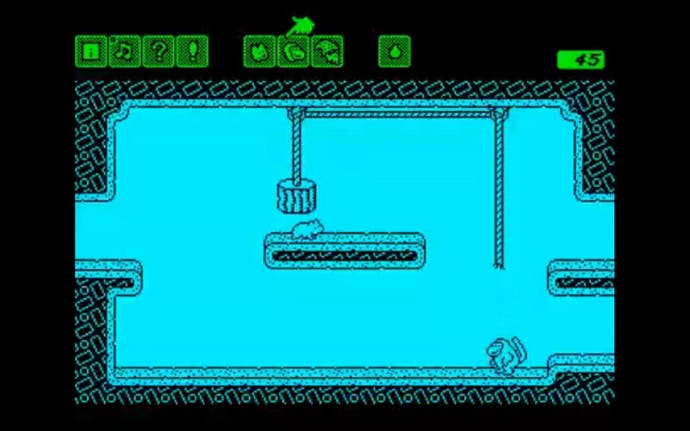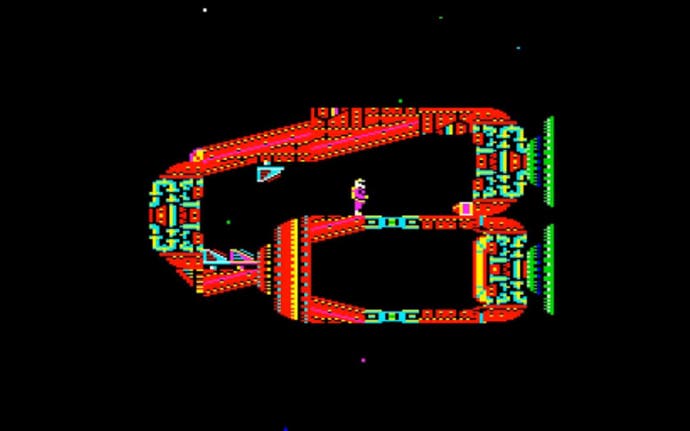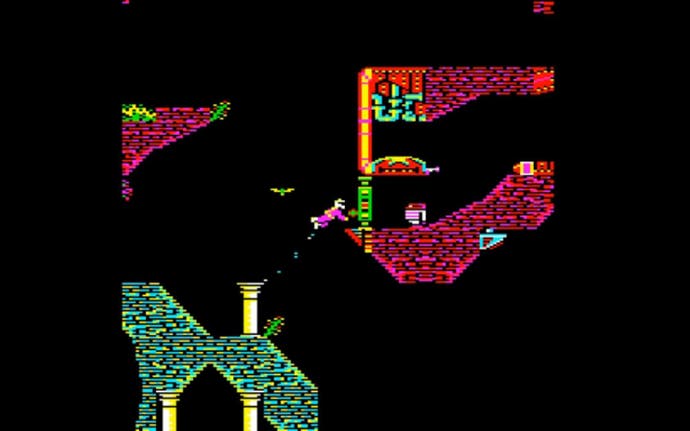Retrospective: All hail the BBC Micro
Do pay attention. This is very BASIC.
As well as realising the comic potential of a baby falling from a balloon with an arrow lodged in its pudgy belly, Imogen was a masterpiece of puzzle-platforming. Every level was fairly sparse, and entirely coloured in a regimentary light blue, yet every single prop and creature overflowed with character - from simple tables and ledges all the way through to characters like the bulldog you made hungry through ringing a Pavlovian bell having stuck poison in his dogfood.
Each bad-pun level ('Tulips from Hamster-Jam', 'Babboonacy', 'Gnu Problem' etc.) ended in finding a teleport crystal to escape to the next, yet every one contained different animals to torment, different reasons to climb ropes and the very occasional toddler to shoot with a handgun. The lovely cat and the lovely monkey, meanwhile, were so beautifully animated that as a kid I'd occasionally waste one of my strictly limited 150 transforms per game just to see their lovely wavey tails and lovely happy faces.

If you weren't a baby blocking a wizard's way, Imogen was pretty great. In fact you can play a PC version of it online, although the graphics aren't half as nice when they're in colour.
Exile
This is it. This is the big one. This is where the humble BBC Micro takes your Super Metroid, rips it to pieces and forces you to painstakingly reconstruct it over the course of the next 15 hours. As with its BBC familiar Elite, Exile came with its own accompanying novel (because proper games used to come with novels) but it also shared that incredible sensation of exploring a strange and dangerous new worlds - albeit this time in the parameters of a jetpack platformer.
It was huge, it was tough, it was filled with rocket launcher-toting Daleks and it had these green bird things that went 'cheep, cheep, cheep' and followed you around the place. In this day and age it might not sound much, but there's a strong argument for Exile being one of the most pioneering games of all time.

The game opened on the surface of the planet to which the evil Triax had been exiled - your mission being to retrieve a spaceship-doofer the nasty chap had purloined. Despite not being old enough to know what physics were, what I loved back in the day were the physics. You dropped out of the opening ship and started falling - experimenting with bursts from your jetpack as you did so. You could fly for ages either left our right (the play area was huge) yet incredibly for a computer so creaky the game conjured up a real feeling of being buffeted by intensely strong alien winds - cartwheeling your spaceman back every time he made some ground into what felt like the infinite bounds of this planet's surface.
What I know now (well, what Wikipedia informs me) is that the remarkable movement of your character in Exile was down to a chap called Jeremy Smith, who is sadly no longer with us, yet first programmed the amazing feat of gravity-awareness that was Superior Software's Thrust. What a guy - turns out he pretty much defined my childhood.
Exile's caves were packed full of rarely repeated enemies - often owing more than a little artistic inspiration to the planet Skaro. Insanely tough to kill, even with lob of the game's ultra-rare grenades, most of the early-game involved running away and trying not to disturb the game's rolling (and flying) menagerie. With no on-screen tips, dialogue or anything handholdy of any description, meanwhile, it was up to you to work out just which of the main chamber's many, many passages you should be going down - and just what items might help you.

It was a colourful place, garish even, and it was routinely full of sprays of exploding bullets and terrifying homing missiles that would thunder after you through the planet's red tunnels while you tried to shake them off.
Above all games from this era, Exile deserves more recognition. It seems such a shame that the magnificent Elite seems to draw all the BBC plaudits, while all your bloody Manic Miners and Jet Set Willys on those damned silly Sinclair machines eat up the majority of the retro love. Well, no more. Not today. Today is the day that the silent BBC Micro faction rise again! Just has been foreseen, in manuals! I've even made a flag with an owl on it! Those ZX Spectrum scum won't know what hit them! Join me, brother! For we march at dawn!
Author's Note: The Glorious BBC Micro Revolution will be starting early, so it might be a bit cold - our advice would be to wrap up warm. We'll be meeting outside the Houses of Parliament where the basic plan is to replace the statue of Churchill with one of Chris Curry. From then on, it's essentially a riot. If people could avoid ransacking and looting the nearby branch of Simply Food then we thought we'd get lunch there, as there's always something for everyone. Anyway, good luck! First one to murder five Sinclair users gets a limited edition ARM processor!
